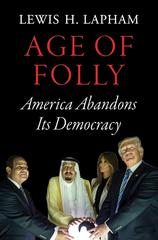 Lewis H. Lapham, "the scholarly patrician who edited Harper's Magazine for nearly three decades, and who in columns, books, and later his own magazine, Lapham's Quarterly, attacked what he regarded as the inequities and hypocrisies of American life," died July 23 at age 89, the New York Times reported.
Lewis H. Lapham, "the scholarly patrician who edited Harper's Magazine for nearly three decades, and who in columns, books, and later his own magazine, Lapham's Quarterly, attacked what he regarded as the inequities and hypocrisies of American life," died July 23 at age 89, the New York Times reported.
After a decade as a newspaper reporter and magazine writer, Lapham became the managing editor of Harper's from 1971 to 1975, then editor-in-chief from 1976 to 1981 and again from 1983 to 2006. He "offered a blend of high culture and populism: the fiction of John Updike and George Saunders mixed with reports on abortion fights, global warming and the age of terrorism--generally, but not always, with a progressive eye," the Times wrote. His last book, Age of Folly: America Abandons Its Democracy (2016), argued that the election of Donald J. Trump was the culmination of decades of degradation of U.S. democracy under a number of Republican administrations. It is available in paperback from Verso.
In 2006, Lapham retired from Harper's and founded Lapham's Quarterly, an intellectual journal that used the lessons of history and the persuasions of literature to dissect modern problems. "The idea was to bring the voices of the past up to the microphone of the present," he told the Times in 2009. "History doesn't repeat itself, but it rhymes."
Many of his books had their genesis in his essays for Harper's, including Fortune's Child: A Portrait of the United States as Spendthrift Heir (1980), a collection of thematically unified columns around his metaphor of America as a spoiled rich kid; and Hotel America: Scenes in the Lobby of the Fin-de-Siècle (1995), which portrayed a society of lost values as it approached the turn of the millennium. In Gag Rule: On the Suppression of Dissent and the Stifling of Democracy (2004), Lapham indicted the Bush administration for what he called its efforts to deceive the nation about the Iraq war's origins and aims.
Lapham also wrote for Commentary, Vanity Fair, Fortune, Forbes, and many other publications. He won the National Magazine Award in 1995 for his columns in Harper's and the 2002 Thomas Paine Journalism Award, and he was inducted into the American Society of Magazine Editors Hall of Fame in 2007.
In a tribute to its "editor emeritus," Harper's noted: "His life and career, at Harper's and later at Lapham's Quarterly, were distinguished by a different approach, not to produce a magazine that would clothe readers 'with opinions in the way that Halston or Bloomingdale's dresses them for the opera,' but rather one that would aim 'to ask questions, not to provide ready-made answers, to say, in effect, look at this, see how much more beautiful and strange and full of possibility is the world than can be imagined by the mythographers at Time or NBC.' "

